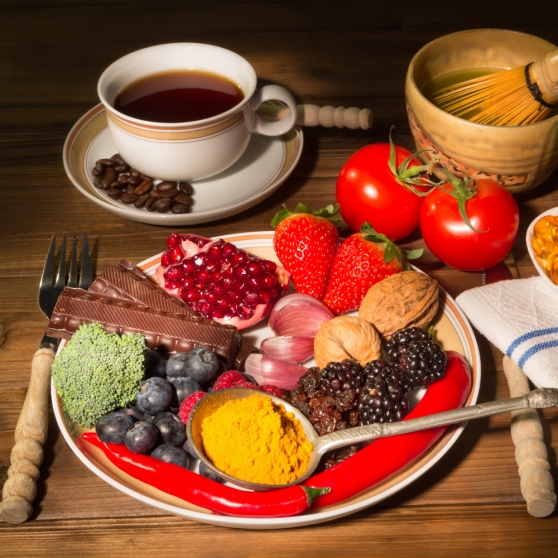Breaking Down Food: Vitamins Explained
What Are Free Radicals and Antioxidants? Free radicals are harmful substances in the body that we may get from unhealthy living conditions or as byproducts of the energy-making process. Even though they can be made in the body, they can be harmful to the body. They may cause anything from brain decline to cancer. Fortunately, antioxidants help to prevent the effects of free radicals. “Antioxidant” however, is more of a blanket term — each form of antioxidants has a specific job. Vitamins C and E and beta-carotene (vitamin A) are considered antioxidants. We hear this word a lot, especially in ads for products like green tea. Although antioxidants are often advertised as a way to prevent cancer, clinical trials have produced insufficient evidence to say this is true.
How Do They Work? Even though they’re called “anti”-oxidants, that’s a bit of a misnomer — antioxidants serve more as a neutralizer. Put simply, free radicals are molecules that have a free electron while antioxidants are stable molecules that can then lend an electron to a free radical, neutralizing it and reducing the damage it can do.
International Journal for Vitamin and Nutrition Research, “Effect of vitamin C on copper and iron metabolism in the guinea pig.” HelpGuide.org, "Vitamins & Minerals: Are You Getting What You Need?" Columbia | Go Ask Alice!, "What’s the difference between vitamins and minerals?" Mayo Clinic, "Water: How much should you drink every day?" Harvard School of Public Health, "Antioxidants: Beyond the Hype" Pharmacognosy Reviews, "Free radicals, antioxidants and functional foods: Impact on human health" National Cancer Institute, "Antioxidants and Cancer Prevention" NIH, "Vitamin A and Bone Health" MedlinePlus Medical Encyclopedia, "Vitamin A" Harvard Medical School, "How to boost your immune system" Health Professional Fact Sheet, "Vitamin A" Colorado State University, "Fat-Soluble Vitamins: A, D, E, and K" Encyclopedia Britannica, "mucous membrane | anatomy" NHS Choices, "Vitamins and minerals - B vitamins and folic acid" EatRight.org, "What Are B-Vitamins and Folate? - From the Academy" MedlinePlus Medical Encyclopedia, "B Vitamins" Mayo Clinic, "Vitamin C (ascorbic acid) Evidence" National Institutes of Health, "Preventing and Treating Brittle Bones and Osteoporosis" Mayo Clinic, "Vitamin C (ascorbic acid) Background" MedlinePlus Medical Encyclopedia, "Vitamin C" MedlinePlus Medical Encyclopedia, "Vitamin C" Health Professional Fact Sheet, "Vitamin D" MedlinePlus Medical Encyclopedia, "Vitamin D" MedlinePlus Medical Encyclopedia, "Vitamin E" MedlinePlus Medical Encyclopedia, "Vitamin K" Image Courtesy of Chris Davis | Dreamstime Image Courtesy of Rancz Andrei | Dreamstime Image Courtesy of Mike_kiev | Dreamstime Image Courtesy of Photowitch | Dreamstime Image Courtesy of Ingrid Balabanova | Dreamstime Image Courtesy of Artcomedy | Dreamstime Image Courtesy of TamCourtesy ofs BognCourtesy ofr | Dreamstime Image Courtesy of Godfer | Dreamstime Image Courtesy of Elena Schweitzer | Dreamstime Image Courtesy of Alinamd | Dreamstime

